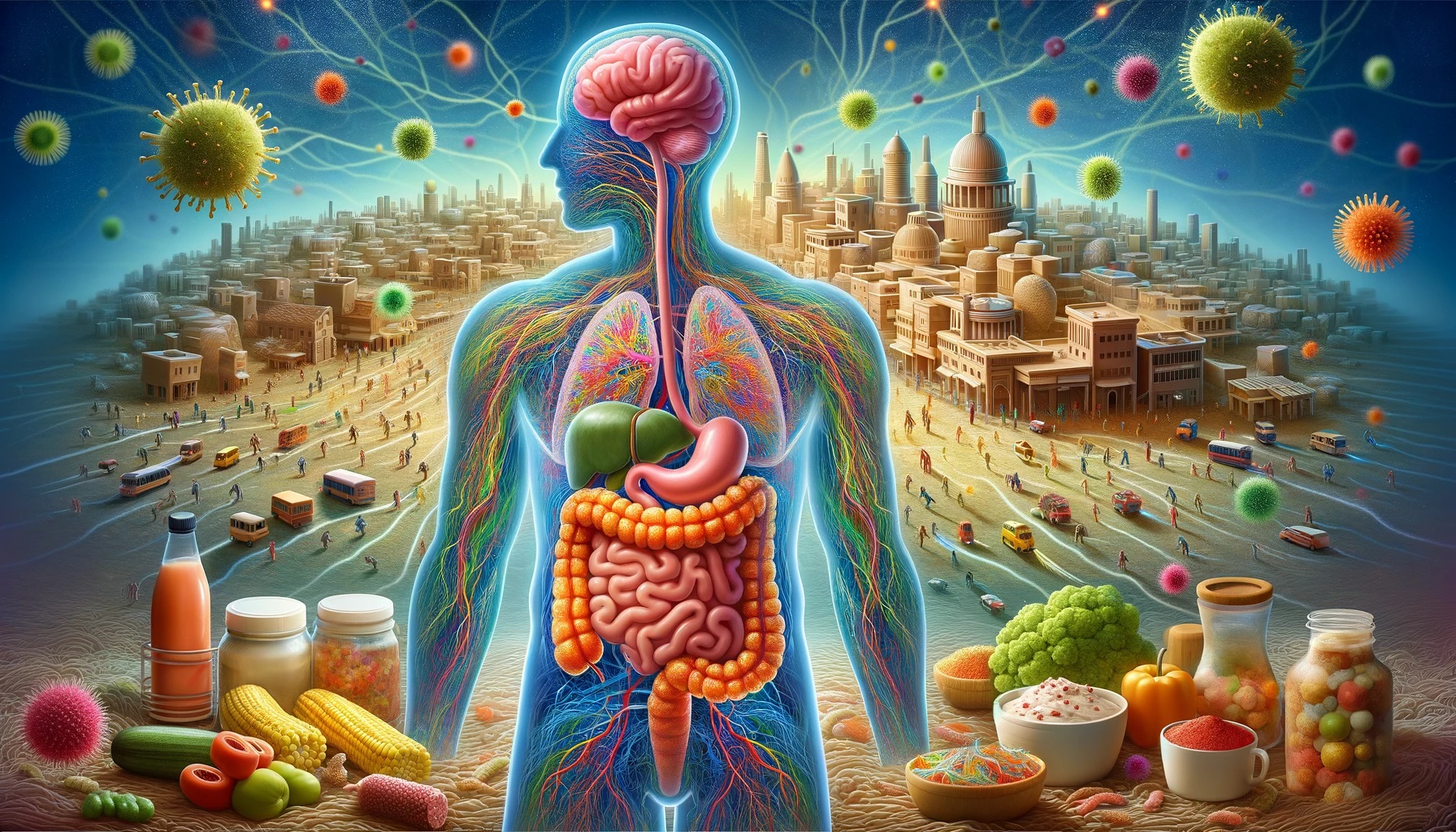· nutrition · 15 min read
Unlocking the Secrets of the Gut Microbiome
Explore the fascinating world of the gut microbiome, its role in health, and how diet influences its balance.

In This Post
The Fact Why Should I Care How To Put In Action Start Tomorrow Guide How does it effect my ability to focus How does it impact my daily life How does it help me make friends How does it help me manage stress How does it effect my mood Summary: Remember Refresher Checklist The Full Research Article CitationsPrint Out The Tomorrow Checklist!
Sign up for our newsletter and receive a copy today, so that, you can start tomorrow! Or the next day, or the day after that. I forget everything and starting things is hard at least for me so these checklists are godsend.
Print Out The Remember Refresher Checklist!
Sign up for our newsletter and download your own copy of the Remember Refresher Checklist, so that, you can easily put it on your fridge and help you stay on target towards your WHY. Every little bit helps.
The Gut Microbiome: An Overview
The gut microbiome comprises trillions of microorganisms, including bacteria, viruses, fungi, and other microscopic living things, residing in our digestive tracts. This complex community plays a critical role in breaking down our food, absorbing nutrients, and protecting against harmful pathogens. The diversity and balance of these microorganisms are crucial for our overall health. Recent research has uncovered that the gut microbiome influences not only digestion but also impacts everything from our immune system to our mental health, making it a focal point in the new era of personalized medicine. Understanding our gut microbiome offers potential pathways to improve health and prevent disease.
The Vital Role of Gut Microbiota in Health
The health implications of gut microbiota are profound and wide-reaching. Here are some key areas where gut microbiota plays a vital role:
Digestive Health: The microbiome aids in breaking down complex carbohydrates and fibers that our bodies can’t digest on their own, facilitating nutrient absorption and healthy bowel movements.
Immune System Regulation: A significant portion of the immune system resides in the gut. Microbiota helps educate immune cells and modulates immune responses, thereby playing a critical role in defending against pathogens.
Mental Health and the Gut-Brain Axis: Increasing evidence shows a strong link between gut health and mental health. Microbiota can produce and influence various neurotransmitters and neuro-active compounds, affecting everything from mood to cognitive function.
Protection Against Diseases: An imbalance in gut microbiota has been linked to a host of diseases, including obesity, type 2 diabetes, cardiovascular disease, and even certain types of cancer.
Antioxidant Production: Certain gut bacteria play a role in synthesizing and releasing important antioxidants, helping to reduce oxidative stress within the body.
Maintaining a Balanced Gut Microbiome: A Checklist
To maintain a healthy gut microbiome, consider the following dietary and lifestyle changes:
- Increase Fiber Intake: Aim for a diet rich in fruits, vegetables, legumes, and whole grains.
- Incorporate Fermented Foods: Foods like yogurt, kefir, sauerkraut, and kimchi add beneficial probiotics to your diet.
- Stay Hydrated: Water is essential for maintaining the mucosal lining of the intestines.
- Limit Processed Foods and Sugars: High intakes can disrupt microbial balance and lead to overgrowth of unwanted bacteria.
- Consider Prebiotic Foods: Foods rich in prebiotics like garlic, onions, and asparagus feed the healthy bacteria in your gut.
- Manage Stress: Chronic stress can negatively impact gut health, so finding stress-reduction techniques is crucial.
Understanding and nurturing our gut microbiome holds the key to unlocking numerous health benefits. From dietary choices to lifestyle modifications, small changes can significantly impact our microbial health, thus supporting our overall well-being.
The Gut as a Second Brain
Understanding the Gut-Brain Axis
The gut-brain axis represents the complex communication network that links the enteric nervous system of the gut with the central nervous system, including the brain. This bidirectional pathway allows for constant dialogue between the gut and the brain, mediated by gut-derived neurotransmitters, hormones, and immune system signals. Groundbreaking research has illuminated how this axis influences not only digestion but also our emotional and mental states, establishing the gut as our “second brain.”
Given its significance, maintaining a healthy gut-brain axis is paramount for overall well-being. Factors affecting this delicate balance include the diversity and composition of the gut microbiome, dietary intake, stress levels, and the presence of pathogenic bacteria. Understanding this connection opens up new avenues for treating various disorders, emphasizing the importance of gut health in achieving psychological well-being and highlighting the role of dietary and lifestyle choices in maintaining this balance.
Impact of Gut Health on Mental Well-being
The state of our gut health holds profound implications for our mental well-being. Research has consistently shown a correlation between the health of the gut microbiome and conditions such as anxiety, depression, and stress responsiveness. The complex mechanisms involve the production of neurotransmitters, such as serotonin and dopamine, in the gut, which directly influence mood and cognitive functions.
- Regular consumption of a diverse range of foods to support bacterial diversity
- Incorporating fermented foods and probiotics into the diet to bolster beneficial bacteria
- Limiting the intake of processed foods and high-sugar diets that can disrupt gut microbiota
- Ensuring adequate intake of prebiotics to fuel healthy gut flora
- Managing stress levels through mindfulness practices, as stress has been shown to harm gut health
- Prioritizing sleep, as poor sleep patterns can negatively affect the gut-brain axis and, by extension, mental health
Implementing these strategies can lead to significant improvements in digestive health, mental clarity, and emotional stability, highlighting the intricate connections between the gut microbiome and mental health. As we continue to unravel the complexities of the gut-brain axis, it becomes increasingly clear that a healthy gut is foundational to psychological well-being and overall health.
Dietary Influence on the Gut Microbiome
The foods we eat have a profound impact on the composition and health of our gut microbiome. This intricate ecosystem within our gastrointestinal tract is home to trillions of microorganisms, including bacteria, viruses, fungi, and other entities. Through a balanced diet, rich in diversity, we can nourish a healthy microbiome, bolstering our overall health and wellbeing.
The Importance of a Diverse Diet
A key element in fostering a rich and balanced gut microbiome is the consumption of a wide variety of foods. This diversity in diet encourages the growth of a diverse microbiota, which is essential for robust health. Varied diets supply different nutrients, which can help to support different populations of beneficial bacteria within the gut.
- A broad range of whole foods including fruits, vegetables, legumes, and grains provides a spectrum of vitamins, minerals, and antioxidants, benefitting not only your microbiome but your entire body.
- Incorporating a mix of dietary fiber sources can also promote the growth of various beneficial bacterial species that metabolize these fibers, producing short-chain fatty acids (SCFAs) known for their health benefits.
Fermented Foods and Their Probiotic Power
Fermented foods are natural sources of probiotics—live beneficial bacteria that can enhance the health of the gut microbiome. Regularly including such foods in your diet can introduce beneficial strains into your gut, aiding digestion, enhancing immune function, and potentially improving psychological wellbeing.
- Fermented Foods Checklist:
- Yogurt with live cultures
- Kefir, a tangy dairy drink
- Sauerkraut, fermented cabbage rich in probiotics
- Kimchi, a spicy Korean side dish made from fermented vegetables
- Miso, a rich, salty paste made from fermented soybeans
- Tempeh, fermented soybeans pressed into a compact cake
Prebiotics: Fuel for Healthy Gut Flora
While probiotics are the living strains that can offer health benefits, prebiotics are non-digestible food components that act as food for these beneficial bacteria. Prebiotics are found in many fruits, vegetables, and whole grains. They help to nourish and stimulate the growth of healthy bacteria in the gut, supporting a balanced microbiome.
- Sources of Prebiotics:
- Dietary fiber-rich foods such as onions, garlic, bananas, asparagus, and leeks contain prebiotics that help feed beneficial gut bacteria.
- Whole grains, like oats and barley, not only offer dietary fiber but also contain beta-glucans, a type of polysaccharide that serves as prebiotic food.
By focusing on a diet rich in diverse whole foods, fermented foods, and prebiotic fibers, you can effectively nurture your gut microbiome. This, in turn, supports various aspects of health, including digestion, immunity, and mental health. Thus, understanding and implementing dietary habits that benefit the gut microbiome is an essential step toward maintaining optimal health.
The Gut-Immune System Connection
How the Gut Microbiome Supports Immune Function
The gut microbiome plays a crucial role in the development and function of the immune system. The vast colonies of bacteria residing in the gut interact with the immune cells, teaching them to distinguish between friend and foe. This interaction helps to prevent the immune system from attacking the body’s own tissues, which is essential for maintaining tolerance and preventing autoimmune diseases.
The gut microbiome influences the immune system in several key ways. Firstly, it helps in the production of essential antibodies, proteins that the immune system uses to neutralize pathogens. Secondly, certain gut bacteria are involved in the maturation of immune cells called T-cells, which play a crucial role in immune response. Lastly, these beneficial bacteria stimulate the production of cytokines and other chemical messengers that regulate inflammation and immune response, ensuring that the body’s defense mechanisms are always ready to counter threats.
The symbiotic relationship between the gut microbiome and the immune system highlights the importance of maintaining a healthy and balanced gut flora. Disruptions to the gut microbiota, caused by factors such as poor diet, antibiotics, or stress, can lead to decreased immune function and heightened susceptibility to infections and diseases.
Probiotics and Immunity: What’s the Link?
Probiotics, the beneficial bacteria found in certain foods and supplements, have been shown to have a positive impact on the immune system. By enhancing gut flora, probiotics play a role in strengthening the body’s defense mechanisms in several ways:
- Boosting the production and effectiveness of natural antibodies and immune cells.
- Reducing the frequency and duration of respiratory infections.
- Enhancing the gut barrier function, preventing harmful pathogens from entering the bloodstream and initiating immune responses.
Incorporating probiotic-rich foods into the diet, such as yogurt, kefir, sauerkraut, and kimchi, or taking high-quality probiotic supplements, can help modulate the immune response and reduce the risk of infections and immune-mediated diseases.
Gut Health and Autoimmune Diseases
The gut microbiome’s impact on the immune system extends to its role in autoimmune diseases, conditions where the immune system mistakenly attacks healthy cells. A balanced gut microbiota helps to prevent the development of autoimmune diseases by maintaining the integrity of the gut barrier and promoting immune tolerance.
Alterations in the gut microbial composition, known as dysbiosis, have been linked to several autoimmune diseases, including type 1 diabetes, rheumatoid arthritis, and multiple sclerosis. Restoring a healthy gut flora through diet, probiotics, and prebiotics can help to mitigate these risks by reinforcing the gut barrier, reducing inflammation, and fostering a healthy immune response.
Maintaining a Strong Gut-Immune Connection: A Checklist
- Include a variety of fiber-rich foods in your diet to promote bacterial diversity and support immune function.
- Consume fermented foods regularly to boost your intake of natural probiotics.
- Consider taking a probiotic supplement if you are unable to get enough from your diet.
- Minimize the use of antibiotics and other medications that can disrupt gut flora.
- Manage stress levels as chronic stress can negatively affect both gut health and immune function.
- Ensure adequate sleep as poor sleep can lead to imbalances in gut bacteria and weakened immunity.
- Stay hydrated to support overall gut health and ensure the proper removal of toxins from the body.
By nurturing a healthy gut microbiome, you can strengthen your immune system, reduce your risk of autoimmune diseases, and maintain overall health and well-being.
FAQs on the Gut Microbiome
As we continue to unlock the secrets of the gut microbiome, many people have questions about how this intricate system affects our overall health. Understanding the connections between the gut and various aspects of our well-being can help us make informed decisions about our diet, lifestyle, and health. In this part, we address some of the most frequently asked questions based on the “People Also Ask” section from Google.
How Does the Gut Microbiome Affect Digestion?
The gut microbiome plays a pivotal role in the digestive process, affecting everything from the breakdown of food to the absorption of nutrients. A diverse and balanced gut microbiota helps to:
- Break down complex carbohydrates and fibers that our bodies cannot digest on their own, turning them into essential nutrients and short-chain fatty acids that are beneficial to our health.
- Produce digestive enzymes that aid in the breakdown of proteins, fats, and carbohydrates, ensuring efficient nutrient absorption.
- Protect against pathogenic bacteria by maintaining a healthy bacterial balance, reducing the risk of infections and diseases affecting the digestive tract.
- Regulate bowel movements by influencing the gut’s motility, thereby preventing conditions such as constipation and diarrhea.
Maintaining a healthy gut microbiome is crucial for optimal digestive health and the prevention of gastrointestinal disorders.
Can Improving Gut Health Influence Mental Health?
Emerging research indicates a significant link between gut health and mental well-being, primarily through the gut-brain axis. Improving your gut health can have a positive impact on mental health by:
- Reducing inflammation: Chronic inflammation in the gut can lead to the production of cytokines that negatively affect brain function and mood.
- Producing neurotransmitters: Many neurotransmitters involved in mood regulation, such as serotonin, are produced in the gut. A healthy gut microbiome can influence the levels of these neurotransmitters, affecting emotions and stress responses.
- Enhancing the stress response: A balanced gut microbiota can improve the body’s resilience to stress, potentially reducing the risk of anxiety and depression.
What Are the Best Foods to Eat for a Healthy Gut Microbiota?
A diet rich in diverse, fibrous, and fermented foods is key to nurturing a healthy gut microbiome. Here is a checklist of foods to include in your gut-health diet:
- Fermented Foods: Yogurt, kefir, kombucha, sauerkraut, and kimchi are excellent sources of probiotics.
- High-Fiber Foods: Vegetables, fruits, legumes, and whole grains provide the prebiotic fiber that fuels healthy bacteria.
- Polyphenol-Rich Foods: Berries, nuts, seeds, olive oil, and green tea are packed with antioxidants that support microbial health.
- Lean Proteins: Fish and plant-based proteins can positively affect gut bacteria composition.
- Foods with Omega-3 Fatty Acids: Such as flaxseeds, chia seeds, and fatty fish, help reduce gut inflammation.
Incorporating these foods into your diet can promote a diverse and balanced gut microbiota, contributing to both digestive and overall health.
Conclusion: Maintaining a Healthy Gut Microbiome
As we reach the conclusion of our exploration into the gut microbiome, it’s evident that the complexity and importance of our gut flora cannot be overstated. The symbiosis between humans and the trillions of microorganisms residing in our gut is crucial for our overall health, influencing everything from mental well-being to immune function. Recognizing this, maintaining a healthy gut microbiome should be a priority for those looking to optimize their health.
Simple Steps to Support Gut Health
Supporting gut health need not be a complicated process. Integrating simple, effective habits into your daily routine can profoundly impact your microbiome’s health and, by extension, your own. Below, find a practical checklist designed to guide you towards a gut-friendly lifestyle:
Incorporate a Diverse Range of Foods: Diversity in diet encourages a rich variety of gut bacteria, which is linked to better health. Aim to include various fruits, vegetables, whole grains, and fermented foods in your meals.
Stay Hydrated: Water is essential for digestive health, helping to break down food and absorb nutrients efficiently.
Regular Exercise: Physical activity can enhance the growth of beneficial gut bacteria, contributing to a balanced microbiome.
Limit Antibiotics Use: While sometimes necessary, antibiotics can significantly disrupt gut flora. Use them only when prescribed by a healthcare professional.
Manage Stress: Chronic stress can harm your gut bacteria. Practices such as meditation, yoga, or regular exercise can be effective in managing stress levels.
Consider Probiotics and Prebiotics: Probiotics introduce beneficial bacteria to your gut, while prebiotics serve as food for those bacteria. Including sources of both in your diet can support a healthy microbiome.
The Journey to a Healthier Gut
Embarking on a journey to improve your gut health is a step towards better overall well-being. Just like any aspect of health, it requires attention and care. However, the benefits of maintaining a balanced, healthy gut microbiome are vast. From improved immunity and digestive health to enhanced mental well-being, the positive outcomes speak for themselves.
By adhering to the simple steps outlined above, and staying informed about the latest research in gut health, you can support your microbiome and unlock the myriad of benefits it offers. Remember, small, consistent changes can lead to significant improvements in your health. The key is to listen to your body, making adjustments as needed to contribute to a happy, healthy gut.
3 Relevant External Links
The exploration of the gut microbiome reveals a world where bacteria and the body interact in a symbiotic relationship, affecting everything from mental health to immune response. To extend your knowledge and understanding of this fascinating field, here are three highly recommended resources:
Understanding the Gut-Brain Link
The Harvard Health Blog: The Gut-Brain Connection provides an in-depth look into how your gut health might be influencing your mood, cognitive function, and overall well-being. This resource is an excellent starting point for those curious about the intricate relationships between the digestive system and the brain.
Importance of Probiotics
The Cleveland Clinic: Probiotics article is a comprehensive guide on the role of probiotics in maintaining a healthy gut microbiome. It dives into different types of probiotics, their benefits, and how they can support gut health and beyond. If you’re pondering over incorporating probiotic supplements into your diet, this is a must-read.
Dietary Tips for a Healthy Gut
Lastly, the Mayo Clinic: Foods that Improve Your Digestive Health offers practical advice on diet choices that can enhance your gut health. This resource breaks down the types of foods that are beneficial for your digestive system, emphasizing fiber, fermented foods, and hydration.
To ensure you’re on the right track towards optimizing your gut health, consider this quick checklist as a guide to incorporating the advice found in these resources:
- Investigate the Gut-Brain Axis: Spend time understanding how mental and gut health are interconnected.
- Explore Probiotic Options: Look into different probiotic foods and supplements that might be right for you.
- Adopt a Gut-Health Optimized Diet: Focus on integrating more fiber, fermented foods, and fluids into your meals.
- Educate Yourself Continuously: Keep up with the latest research and findings on gut health by regularly referring to reputable sources.
These selected resources serve as a springboard into the vast and intriguing world of gut health. They underscore the significant impact that the gut microbiome has on overall well-being and provide practical steps and dietary tips for nurturing a healthy gut ecosystem.
- gut-microbiome
- gut-brain-axis
- fermented-foods
- dietary-fiber
- prebiotics
- probiotics
- immune-system
- digestive-health
- mental-health
- autoimmune-diseases
- bacterial-diversity
- gut-flora
- immunity-boost
- fiber-rich-diet
- gut-derived-neurotransmitters
- psychological-well-being
- gut-inflammation
- microbiota-gut-brain-communication
- antioxidants
- gut-health-diet
- digestive-enzymes
- healthy-gut-bacteria
- gut-permeability
- gastrointestinal-health
- probiotic-supplements
- microbial-health
- biotic-balance
- pathogenic-bacteria
- gut-microbial-composition
- intestinal-microbiome





